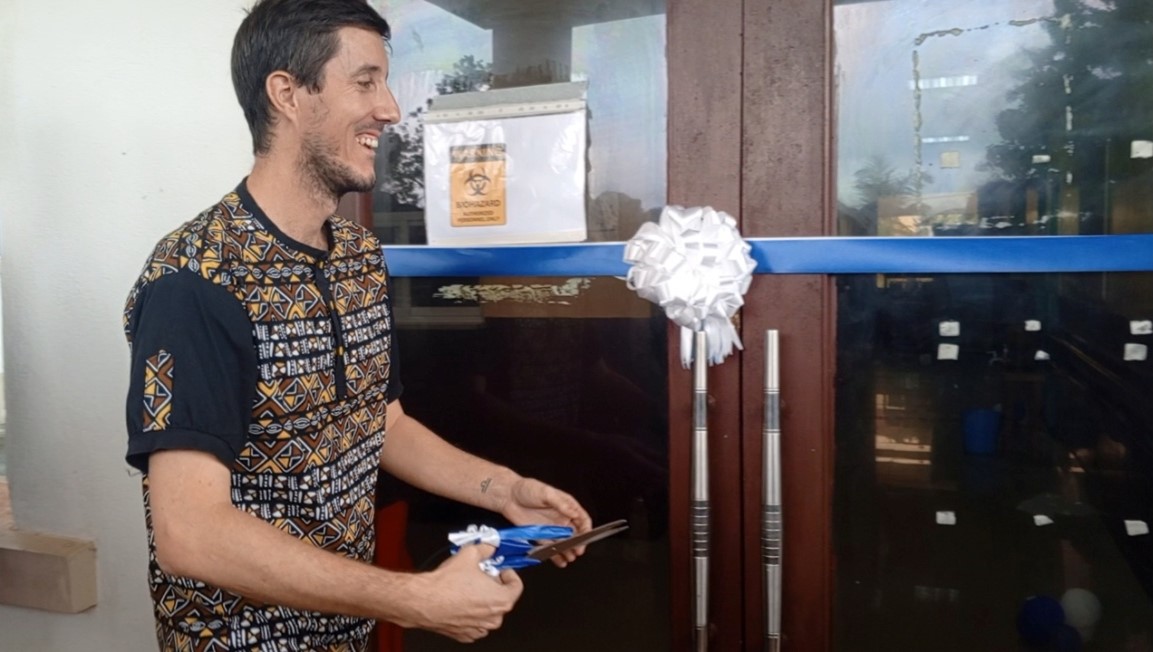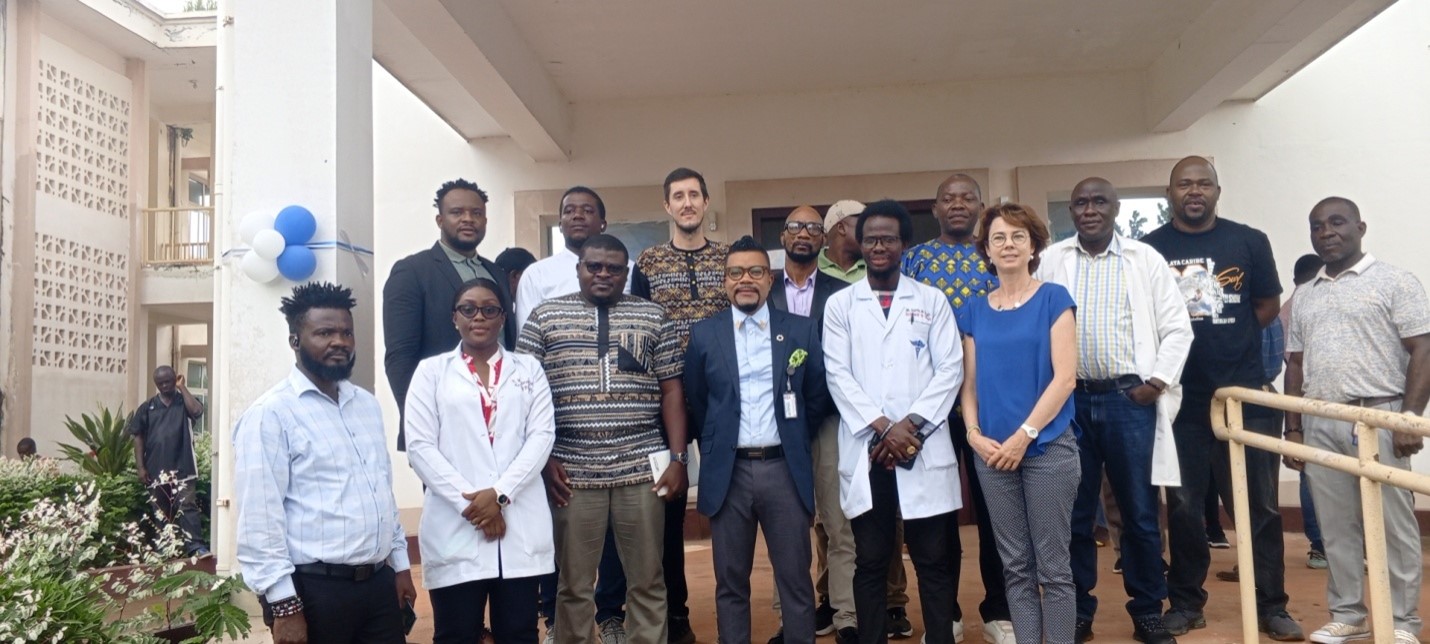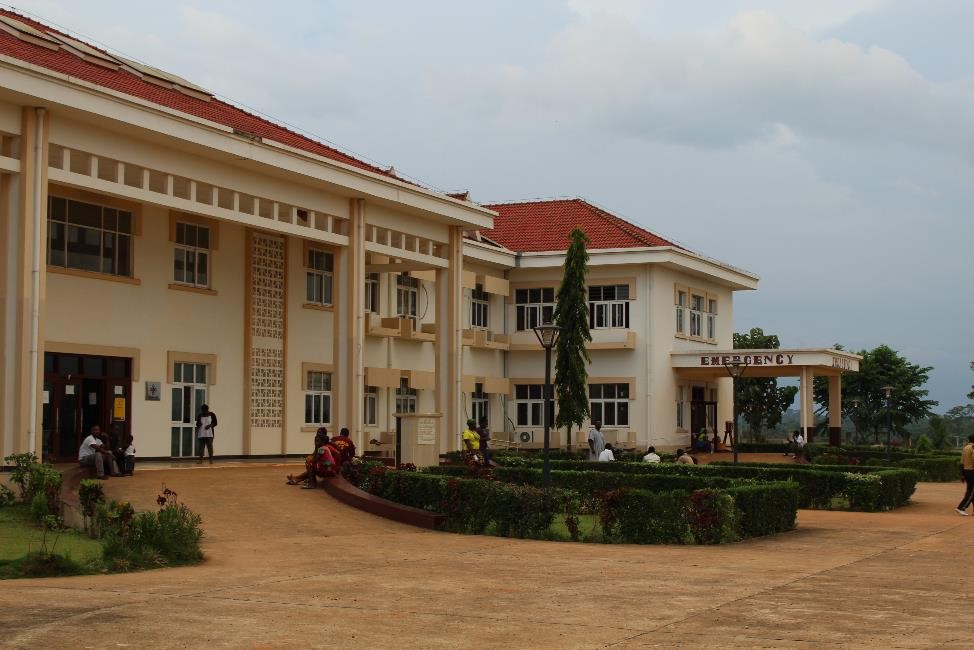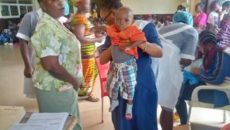TAPPITA, Nimba – A new polymerase chain reaction laboratory meant to curb the spread of Lassa fever in Liberia has been dedicated at the Jackson F. Doe Memorial Regional Referral Hospital in Tappita.
FIND International, in partnership with the University of North Carolina’s Global Projects Liberia, inaugurated the lab on Thursday, July 11.
The new laboratory will mostly be used to test for Lassa fever, an acute viral hemorrhagic fever that spreads to humans through exposure to food or household items contaminated with the urine or feces of infected rats.
Speaking at the official dedication, the scientific officer working with the FIND Pandemic Threats Team, Hanesh Chi, explained that the lab is part of a larger project FIND is implementing in low- and medium-income countries, in West Africa, including Liberia and Nigeria – the Outbreak Response and Preparedness Project.
Chi said with the level of training done and equipment procured, the laboratory can help in testing for other diseases beyond Lassa fever.
“We started this project in Nigeria based on a call from [the Nigeria Centers for Disease Control] after the Lassa fever outbreak in 2018, and we were able to perform similar roles in Nigeria and the project was quite successful, and we felt it was important to extend this initiative to Liberia so that we can ensure that we strengthen their capacity of responding to outbreaks of Lassa fever in the region,” he said.
He disclosed that the Outbreak Response and Preparedness Project in West Africa has four packages, and capacitating the Jackson F. Doe Hospital to test for Lassa fever was under package one. He said package two would support two studies at the Phebe Hospital in Bong to be able to evaluate three emerging diagnostics for Lassa fever, two Lassa fever methods for infection prevention and control, and a Lassa fever PCR test.
He’s hopeful that the data will inform the use of the emerging diagnostic that could lead to the creation of a region-wide harmonized testing for Lassa fever.
The FIND scientific officer described the new laboratory setup at the Tappita hospital as a great milestone in the fight against Lassa fever because the laboratory will bring testing for Lassa fever closer to the communities where the outbreak usually occurs.
He told the UNC and JFD Hospital families that his organization would further partner with them in ensuring that they safeguard the health of the country and the region.
He encouraged the community to make use of the laboratory, noting that the investment they made in setting up the facility would be of no use if members of the community failed to turn out to use it.
“We want to thank you for sharing the vision with us for detecting and combating outbreaks of Lassa fever whose impact we cannot overemphasize here,” he said.
“We believe that this is a great milestone in bringing the test closer to the communities where these outbreaks really occur, and we also want to use this opportunity to say we would still like to partner with you and collaborate with you on initiatives like this to ensure that we safeguard the health of our community and the region as a whole.”
Meanwhile, the deputy country coordinator for the University of North Carolina’s Global Projects Liberia, Thomas S. Remont, said his organization is a research group that has been in Liberia since 2014 during the Ebola Outbreak. Since 2018, it has switched focus to Lassa fever. He said hundreds of people are detected to be positive for Lassa fever every year.

UNC’s Deputy Country Coordinator, Thomas S. Remont, cuts the ribbon to the laboratory. Photo: Jerry Myers.
Remont said his organization was engaged by the Phebe Hospital administration to assist them in testing for Lassa fever because they never had the capacity to deal with the virus. To date, he said the organization has made progress by setting up test facilities and providing testing kits, thus making progress in getting results.
He added that the organization has also trained technicians in research and Lassa fever treatment at Phebe Hospital and the Jackson F. Doe Hospital, challenging the staff to take ownership of the laboratory.
Remont informed the gathering that between May 1, 2021, and July 14, 2024, there were 65 confirmed cases of Lassa fever at Phebe Hospital, including 14 deaths recorded, constituting a 21.5 percent fatality rate.
He said Lofa, Nimba, Bong, and Grand Bassa are counties where Lassa fever is prevalent but also pointed out that it might be in other counties. He blamed the lack of diagnostic centers and training as reasons other counties may not be reporting cases.
“With the support of [the National Public Health Institute of Liberia] and [the National Reference Laboratory], we have done an assessment across the main region where Lassa is known. We assessed four different laboratories, the LAC Hospital, which is known to have a lot of Lassa cases, the Zorzor Hospital, the Sanniquellie Hospital, and [Jackson] F. Doe. In line with NPHIL recommendation and especially for a long-term plan of the country, [Jackson] F. Doe was selected as the best option for the establishment of the PCR Lab; and it’s been so far quite successful,” he said.
For his part, the chief executive officer of the Jackson Fiah Doe Hospital, Dr. Victor Kaizer, described the inauguration of the PCR lab as a great venture that will go a long way in alleviating the constraints of laboratory processes leading to testing of Lassa fever at the hospital.
Kaizer recalled that in the past, the hospital sent samples of suspected Lassa fever patients to Monrovia, which would take more than two to three weeks to get results.
With the presence of the lab, he said the result would now be provided in a short period of time, which makes containing the spread of Lassa fever much more effective.
He said he’s optimistic that the PCR lab will enable the hospital to conduct accurate tests that will significantly help patients to be treated for the right diseases at the right time.
“We want to appreciate our donor partner in partnership with the UNC Global Projects Liberia for rehabilitating the previous PCR lab by investing in the complete overhaul of the space that was provided here,” Kaizer added. “We are grateful for the backup generator that has been installed to supply power when [the power grid] goes off [and] the installation of furniture, equipment, provisions and supplies and training of our laboratory staff. It is our hope that this partnership will go a long way for the betterment of the healthcare delivery system in our country, most especially in Nimba County.”

FIND and UNC executives posed for a photo with JFD Hospital administrators after the dedication of the laboratory. Photo by Jerry Myers.
To ensure the lab is sustained even in the absence of donor support, Kaizer said he will lobby with the lawmakers to ensure adequate funding is provided to the hospital in the next budget, disclosing that the current allotment to the hospital is insufficient to run the lab and other projects that are being left with the hospital by their partners.
“We have the eye clinic here through another partner that is going to be turned over to the hospital in December, and with this laboratory, it is going to be turned over pretty soon, and then we have another dental clinic that is to be established pretty soon,” Kaizer said.
“So when all these donors leave, it becomes the hospital’s responsibility, and it is no longer those donors’ responsibilities… but the current budgetary allotment we have, it will be nearly impossible to run these. So, we are hoping maybe the next budgetary period, something can be done in terms of allocation to be able to properly sustain these labs because we know everything is about sustainable.”
On behalf of the District Health Team, the district health officer of Tappita Health District hailed the partners for establishing the lab. Angeline Beangar recounted the difficulties and delays her team faced in getting specimens to Monrovia for testing, describing the process as ‘very hectic.’
Beangar called on community members to help her team keep surveillance in the community and challenged them to report strange sicknesses for testing at the lab.
Featured photo by Ballington Chie



